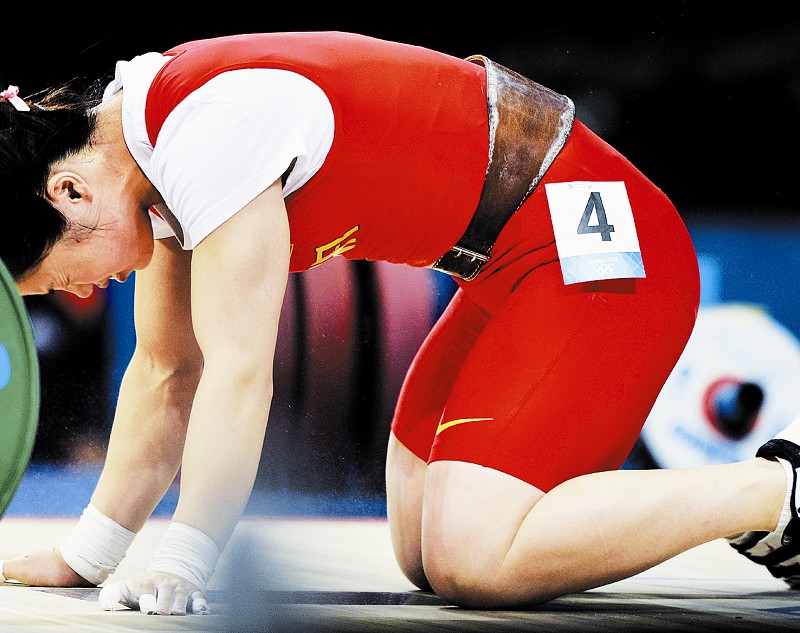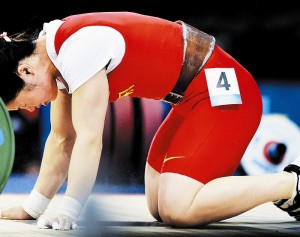What does Olympic obsession do for—or to—the athletes subjected to it? And what does it gain the average citizen? China’s intermittent lead in the medal count speaks to the strength of its “national system” (举国体制) for training elite sportsmen, a Soviet-style program of gruelling training. Some netizens want to know what good the national system does the country as a whole. From Weibo:
LittleCloudDing: What kind of Chinese person with a brain would consider the number of gold medals China wins some huge deal? Unless you have some connection with the Olympics. A country with a nationalized athletics program is really a country that raises athletes like livestock to train on your behalf. They take money that should be spent improving everyone’s physical fitness and spend it on a chosen few. The only problem is, can someone really exercise for you? Not to mention, the nationalized athletics program is a brutal affair, dirty and corrupt behind the scenes.
丁 小云 : 一个有脑子的中国人怎么可能会把中国能得多少奥运金牌特当回事儿?除非与之有利益瓜葛。一个用举国体制搞体育的国家,说白了就是国家圈养一些运动员代表你 锻炼身体,把大多数本该用来全民健身的钱都挪用了。只是锻炼身体这事儿能由别人代表吗?而且体育举国体制是特残酷的一件事,背后满是肮脏和腐败。
Bido_q: The French say China is too strong, that we take home all the gold medals, while they are too weak. The problem is, when you look at the physical fitness and the lifestyle of the average male [Chinese] exchange student, the dark side of physical education in our nation rears its head. I’m a classic, skinny example. The only thing that taking home all these gold medals can prove is that Chinese are not physically inferior to other people. It’s just sad that most of the rabble don’t even have access to a nutritious lunch from a young age, let alone comprehensive physical education.
Bido_q: 法国人说中国太强了,把金牌全拿了,还说法国太弱。问题是,看看这广大留学男生的平均体质和生活方式,这体育大国的底裤就露出来了,我就是一个太瘦的典 型。我觉得拿这么多金牌的唯一意义就是说明中国人体质完全可以不输别人,只可惜广大屁民从小既没营养午餐又没项目丰富时间足够的体育课。
According to censorship directives leaked to CDT, Chinese media are no longer permitted to report or comment on the issue of the national system.
Netizens also question the measure of Chinese Olympians’ success. Some commented on the stark contrast in the treatment of two female Chinese shooting medalists, Yi Siling and Yu Dan. Yi took home gold and glory; Yu, only bronze:
HandsInPockets: Two Chinese athletes differ only by their medals: Yi Siling won gold and Yu Dan won bronze. But their treatment by the media couldn’t have been more different. A congratulatory message from the State Council didn’t even mention Yu Dan. CCTV didn’t air a single shot of Yu’s face. After a reporter finished interviewing Yi he thought of Yu, but she had already quietly left the building. This country has no understanding of respect. You’re not great unless you bring home the gold.
双手插裤兜儿 :同样两个中国选手,易思玲得了金牌,喻丹得了铜牌,但得到的待遇却天壤之别,国务院发的贺电上没有喻丹的名字,CCTV连一个对准喻丹的特写镜头都没 有,当记者采访完易思玲想起喻丹的时候,她已经悄然离开,在这个不懂得尊重的国度里,除了金牌本身,没有任何伟大。
ACertainS: The reporter conducting interviews seemingly forgot about bronze-winner Yu Dan, who had been standing off to the side. This sweet, quiet girl understood what was going on and quietly left. Yu Dan, your hard work on behalf of this country’s fragile sense of vanity would be appreciated just as much as that of the champion even if you hadn’t made it into the finals.
某S是我:赛后采访时记者似乎忘记了站在一边获得铜牌的喻丹,这个温暖恬静的女孩很懂事的默默离开了,你为这个国家脆弱的虚荣心付出的同样多,在我们心里,你和冠军一样精彩,就算你没入围也一样。
MorningNews: Yi Siling’s Hometown Lights Hour of Firecrackers; Only Two People Greet Bronze Medal Winner at Airport: Just how much difference is there between gold, silver and bronze? For Yi Siling, the winner of the first gold medal of the London Olympics, the local government back home set off an amazing firecracker display. Some say it lasted more than an hour. But bronze medal winner Li Xuanxu, who also hails from Hunan Province, was greeted at the Beijing airport today only by her mother and aunt.
新闻晨报:【易思玲家乡燃放1小时烟花 铜牌得主只有两人接机】奥运亚军、季军与冠军的距离究竟有多远?在夺得伦敦首金的易思玲家乡,由桂阳县委县政府组织的烟花焰火,据说足足持续了一个多小 时。同样是湘妹子,夺得女子400米混合泳铜牌的李玄旭今天将抵京,就只有妈妈阿姨接机。
One reporter reminisced about a similar Olympic shaming:
bijian1972: This image is deeply engraved into my reporter’s memory: In the meeting room of a county-level hotel, a dozen or more reporters and athletics department officials surrounded the elderly parents of an Olympic hopeful. After the athlete failed to win a prize, the room emptied in a flash, and the elderly pair was left there with nothing but desolation. No one even saw the old folks back home.
bijian1972: 有这样一幕,深深镌刻在记者的脑海里。一间县宾馆会议室,几十名记者、体育局官员围着山村里接来的一对年迈的奥运选手父母。当奥运选手夺奖牌无望后,刹那间只留下年迈的父母,以及一骑绝尘的悲凉,甚至,都没有人送老人回家。
Yu may be thankful for the lack of attention. After failing three times to complete a lift, Zhou Jun’s defeat was labelled by The Metropolis Times “Chinese women’s weightlifting’s most disgraceful failure ever.” While the paper later apologized, Zhou has found the most support in social media:
ShenChen: It’s disgraceful, alright! But the disgrace does not belong to this 17-year-old girl who gave her complete effort. The disgrace is the country’s perverted obsession with the Olympics. The disgrace is the ease with which we can disregard our principles. The disgrace is the institutionalized pressure felt by those who come in second place to apologize. The disgrace is how a champion’s praise of other athletes is completely ignored. The disgrace is that we get off on conflating our dominance in sport with the strength and prosperity of our country.
申晨: 的确是耻辱!耻辱的不是这个已经尽力的17岁孩子,耻辱的是国家对奥运的变态狂热,耻辱的是我们可有可无的选拔原则,耻辱的是亚军都要道歉的行政压力,耻辱的是冠军就表彰其他运动员就没人理的无耻境遇,耻辱的是我们把称霸赛场当做国富民强的意淫。
CaiYaoqi: Yesterday, the Taiwanese delegation finally took home its first medal. 21-year-old Shu-Ching Hsu won silver after first lifting 96 kg, then 123 kg, for a total of 219 kg. For her outstanding performance, she was awarded NT$7 mil by her country! (In Taiwan, winning a silver medal is a national honor, but on the mainland, taking home a silver is worth crying about and is considered letting down your country and your people.)
蔡耀圻:2012年倫敦奧運台灣代表團昨天終於獎牌開張,女子舉重53公斤級、21歲許淑淨以抓舉96公斤、挺舉123公斤,總和219公斤奪得銀牌,也獲得國光獎章獎勵金700萬元!(在臺灣拿銀牌,舉國歡騰,在大陸拿銀牌,痛哭流涕,直呼對不起國家,對不起人民)
Upon winning silver, male lifter Wu Jingbiao sobbed to a reporter, “I have disgraced my country, I have disgraced the Chinese national weightlifting team, and I have disgraced all those who care about me!” The reporter stepped on camera to console Wu.
Gold is no guarantee of happiness, however. Some of China’s gold medalists have sacrificed nearly everything, especially family:
MorningNews: “Li Xueying’s Tearful Father: ‘We Haven’t Seen Each Other for Two Years”: When Li Xueying won the women’s 58kg-class weightlifting gold medal, her father, who had been watching in the audience, was moved to tears. When a reporter asked how he planned to celebrate with his daughter, he choked up, saying, “I just want to see her immediately. We haven’t seen each other for two years! She’s my daughter, after all. She’s my pride and joy!
新闻晨报:【李雪英父亲含泪:我们已两年未见】当李雪英夺得举重58公斤级金牌时,坐在现场观众席上的父亲李相民眼里泛着泪花。当记者问他想如何与女儿庆祝时,他突然热泪盈眶,哽咽着说:“我就是想马上见到她,我们已经两年没有见了,自己的孩子嘛!她是我的骄傲!”
Still others did not even know what kind of sacrifices were made on their behalf. Wu Minxia learned only after she won gold in female doubles diving that her mother has been diagnosed with breast cancer and that her maternal grandparents have both passed away. Wu’s parents struggled with these secrets for years. Male diver Qin Kai, who trained in Beijing far from his family in Shaanxi Province, did not know about the deaths of his cousin, uncle, and two grandfathers until 2006—his grandfathers passed away in 2002 and 2005, and his aunt and cousin were killed in a car accident in 2000. After winning the 2006 World Cup, Qin told his father, “If my grandfathers, my uncle and my cousin were here to see me win, I think they would be happy. I want to give the prize money to Auntie to buy a house. Do you have any objections?” His father couldn’t say no. Qin won gold in the men’s 3m springboard competition in Beijing and again in London.
More on China’s “fetish for first” from CDT.
Via SneezeBloid. Translation by Little Bluegill.









